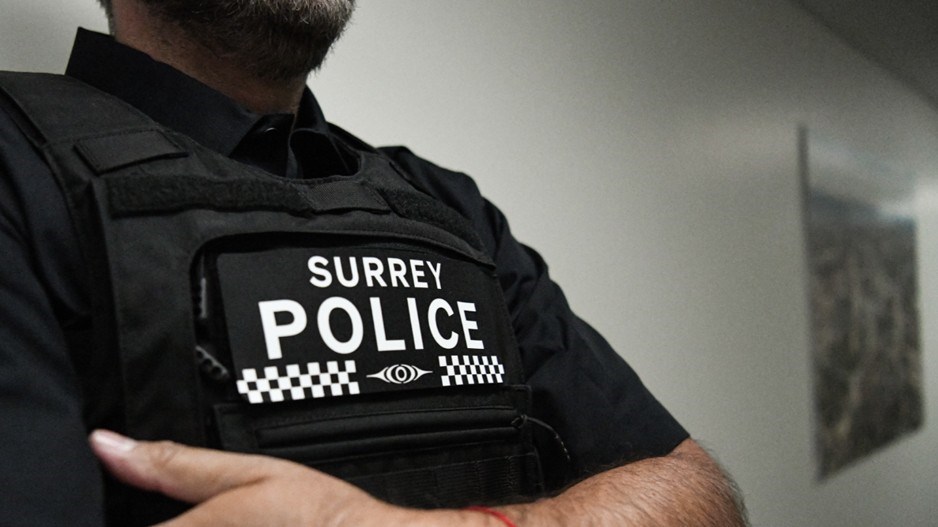The drawn-out, up-and-down, back-and-forth, off-and-on process to determine who gets to police the City of Surrey is a great case study for governments at all levels on how not to make big decisions.
It has left a divided and uncertain community and an undermined mayor and council. If only it were possible to figure out who to blame or who to thank.
If you’ll recall then-mayor Doug McCallum – and how can we forget? – he corralled his then-supportive council and conducted a public safety referendum five years ago which produced a path to turn away from more than a half-century of RCMP local law enforcement.
It was a bold political move – some thought of it almost as a stunt, characteristic of McCallum’s many moonshots and propensity for fantasy.
But even a broken clock is correct twice a day. McCallum was right to note that Surrey was the largest Canadian city without its own local police force. He was also correct in surmising that the federal government didn’t want to stay in the contracted police business terribly much longer. It was possible, in suggesting a local solution, to imply that the force at Ottawa’s discernment was in part to blame for local conditions, so it was clever politically, too. It was a police do-over.
And so, with the backing of the referendum, a transition was in the air.
But not so fast.
One of his councillors, Brenda Locke, eventually turned tail on McCallum generally and the local policing idea specifically. She used her about-turn as a wedge with the mayor in her campaign to succeed him. But hers was a Pyrrhic victory, because by the time she earned office last October, hundreds had applied for and joined the fledgling force. Surrey had two police forces in the fold, one experienced and one exuberant, one active and one in the wings.
If McCallum’s move seemed a mistake that was making more and more sense, Locke’s move seemed sensible but more and more a mistake. Her initial support of a local force appeared to have the ear of the province, whereas her latter support of the status quo had neither the ear from Victoria nor a ringing endorsement from Ottawa. Indeed, on the eve of the province’s announcement this week, the feds affirmed they want out of the local police business.
Much silly business ensued, including reports from the pro and con contingents that were redacted and only read by officials under the cone of silence, as if they were documents more serious than the stuff in the Mar-a-Lago bathroom.
Eventually the province had had enough of the nose-thumbing, was concerned enough by the threat to provincial policing by the Locke council plan, and determined this week that the McCallum plan – the one originally supported by Locke, and for that matter the referendum voters – was the call. Along the way Solicitor General Mike Farnworth had set the bar high for Locke to meet in retaining the Mounties and offered financial inducements to let them go.
He argued they’d gone far enough down the highway that they’d run out of gas in trying to turn back. There is a serious Mountie shortage in 小蓝视频, and he said replenishing the Surrey detachment would hurt the force’s operational effectiveness elsewhere provincially. “It’s just not safe to go backwards,” he added.
Locke was unimpressed and thought the police beauty contest was rigged. “We had a choice so long as it was Minister Farnworth’s option,” she grumbled. She and some others question the province’s right to direct municipalities on how they’ll be policed – not so much on whether they can, but whether they should.
For those who wonder why it took this long to confirm the initial Surrey move, Farnworth argued that he only used the Police Act powers to direct the city when Surrey hatched the RCMP plan in such a way as to jeopardize policing in the province. Even so, it’s a hot mess right now. There must have been a better way.
The rhetoric reached a peak this week when the mayor accused the minister of misogyny and bullying, so it’s going to take some therapy to get them to work together, but work together they must. To bring the team along, the province has reached across the aisle somewhat to enlist former 小蓝视频 Hydro CEO and 小蓝视频 Liberal-era deputy minister Jessica McDonald to mediate, navigate and take the temperature down.
The timeline for the transition is less than clear, and this local force may only be a step toward a provincial police force. But now that there is clarity on who will be walking the beat, Locke would be unwise to litigate. She won the mayoralty in part for her policing pledge but mainly because she was replacing the forlorn and fumbling guy whose idea just so happened to prove prescient and proper.
Kirk LaPointe is publisher and executive editor of Business in Vancouver and vice-president, editorial, of Glacier Media.




